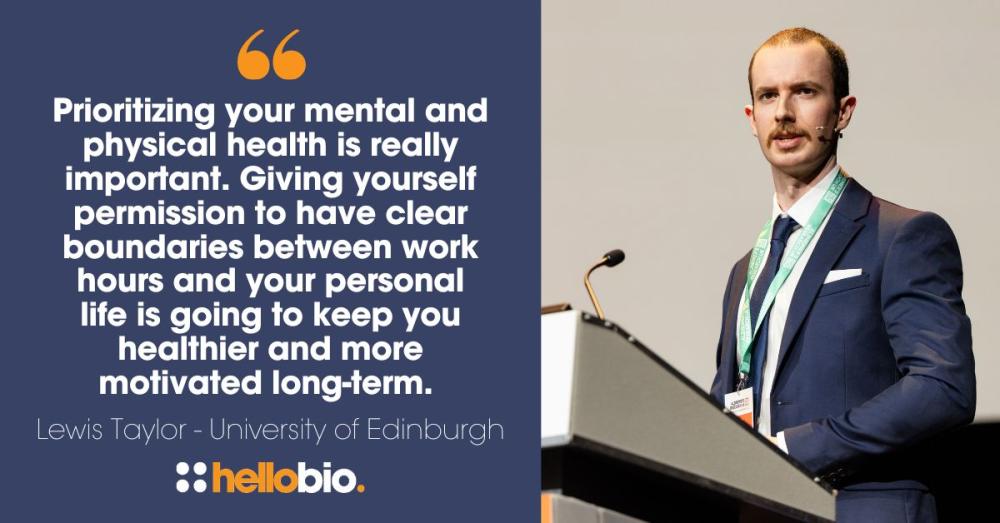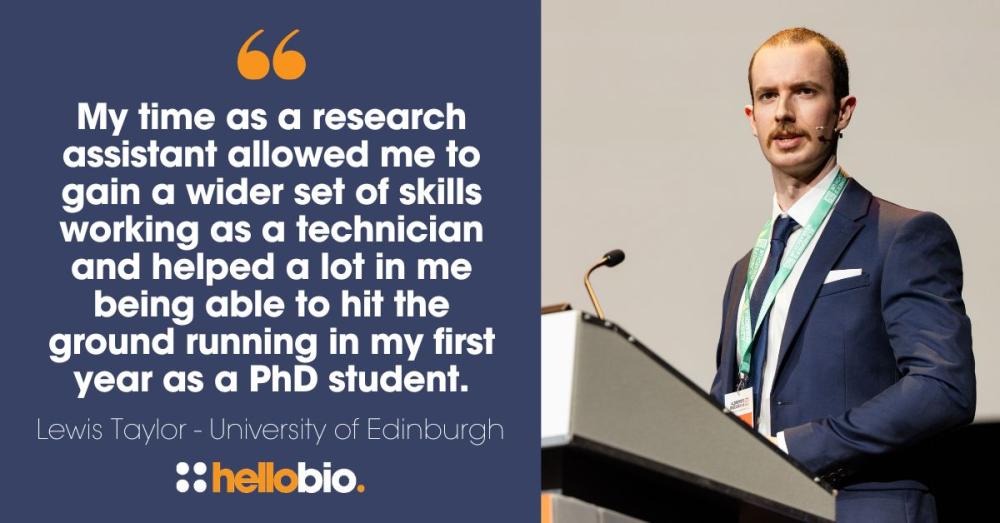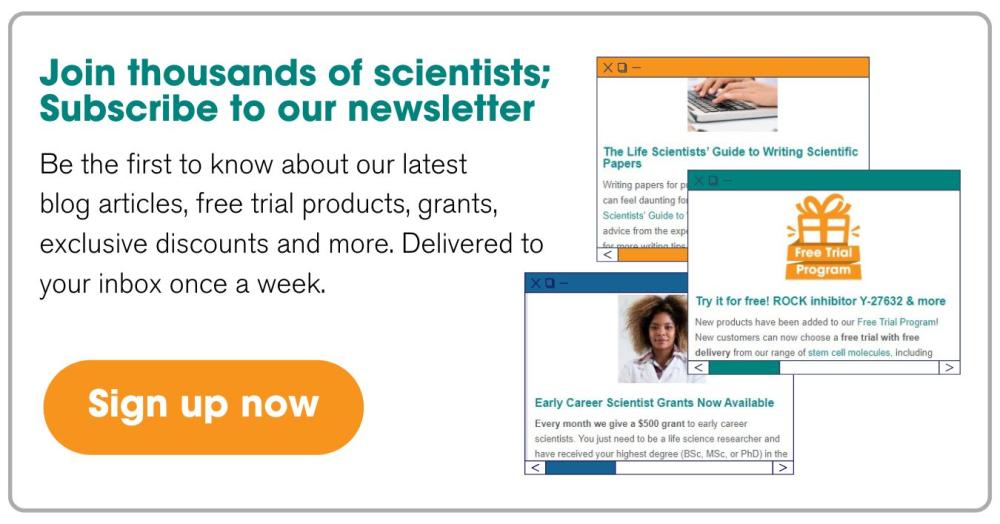Interviews with Scientists: Lewis Taylor
It’s time for another installment of our Interviews with Scientists series, and this time we were delighted to speak to Lewis Taylor, a PhD student at the University of Edinburgh in Scotland!
Lewis is studying neuroscience in Dr Claire Durrant’s lab which investigates various aspects of neuropathology in neurodegenerative diseases. Lewis completed a Neuroscience BSc programme at the University of Sussex, and later took a role as a research assistant at the University of Edinburgh before starting his PhD in the same lab in 2024.
We spoke to Lewis about his PhD research, his first professional talk at a conference, and the importance of prioritising mental health in science research. He also shared valuable advice for other PhD students, as well as his hopes for the future of neuroscience research.
Hi Lewis, please can you tell us a little bit about your current role at the University of Edinburgh?
I am a first-year neuroscience PhD student working under the supervision of Dr Claire Durrant and Dr Paul Brennan. I recently started my PhD after working full-time as a research assistant in Claire’s lab for a little over a year. Our lab specialises in the use of brain slice culture models to investigate various aspects of neuropathology implicated in neurodegenerative diseases. We also investigate the utility of pharmacological compounds in modulating disease-relevant proteins and biological pathways of interest. An example of this can be seen in my recent first-author paper, which was published in Acta Neuropathologica earlier this year.
What is the focus of your PhD research?
My PhD project focuses on characterising the mechanisms by which neuroinflammation may contribute to neurodegeneration using living brain slice culture systems.
Did you always want to work in science when you were younger, and if so why?
My interest in neuroscience began whilst studying for my A-levels (subjects: Chemistry, biology and psychology), where I developed a particular interest in neuropharmacology. However, at the time I was unsure as to whether I wanted to pursue neuroscience at university, as I also had interests in medicine and psychology as other potential career options. As a result, I took a gap year to consider my options and found renewed inspiration to study neuroscience, applying to the Neuroscience BSc programme at the University of Sussex. My interest in neuropharmacology lay in understanding the mechanism of action of therapeutic drug compounds, their modulation/interaction with synaptic transmission, and investigating the potential of novel compounds to treat diseases with an unmet medical need.
What excites you most about the work that you do?
Our lab is in a relatively unique position to model biological aspects of neurodegenerative diseases using human brain slice tissue cultures. We envisage that this will offer improved translational value to the field, with the ability to study human disease-relevant biological pathways of interest, across time, in living tissue. One of the most exciting parts of being a research scientist is observing an experimental result, or something unintended or unexpected in the lab, which no one else has likely seen before. Having access to a broad range of neuroscientific tools/techniques in the lab makes my work even more exciting, offering the ability to investigate biological phenomena at multiple levels of resolution.
What are the biggest challenges or obstacles you’ve faced in neuroscience research so far?
Personally, this has been managing my long-term workload to avoid becoming burnt out. I have had the fortune of being in supportive lab environments and having good role models, but keeping yourself in check will make you more efficient and more productive long-term. Having said this, working in a fast-paced lab environment will mean that you will need to work longer and faster on some days compared to others. Prioritizing your mental and physical health is really important. Giving yourself permission to have clear boundaries between work hours and your personal life is going to keep you healthier and more motivated long-term.
You recently attended the Alzheimer’s Research 2024 Conference. What was your biggest takeaway from the event?
Asides from being able to see some fantastic talks and expand my professional network, a highlight for me was being able to give my first talk at an academic conference on the ECR day. This was a big step forward in my development as an early career researcher – I really enjoyed it and it was great to summarise the work that went into my first-author paper, which was published in January.
What are your hopes for the future of dementia and neuroscience research?
In the last couple of years, we have seen some promising advances in the efficacy of immunotherapeutic compounds developed to treat neurodegenerative diseases, but it is possible that treating and/or preventing causes of dementia such as Alzheimer’s disease will require multiple therapeutic approaches. My hopes are that work continuing to characterise the association and role of aspects of neuropathology in post-mortem tissue (e.g. Professor Tara Spires-Jones’ lab), combined with the use of disease-relevant models to study mechanisms of degeneration in living tissue (e.g. our work in Dr Claire Durrant’s lab), will accelerate our ability to discover key therapeutic targets and test the efficacy of novel compounds to act upon them. Asides from the importance of work such as this for foundational scientific discovery, we should be aiming to accelerate progress, either directly or indirectly, towards the discovery of better therapeutic treatment strategies.
You’ve received funding from Race Against Dementia and The James Dyson Foundation. What advice would you give to other PhDs who are applying for similar funding opportunities?
As you have mentioned, our lab is collectively funded by two charities: Race Against Dementia and The James Dyson Foundation. I can’t offer specific advice about this as my project funding, provided by a donation grant from The James Dyson Foundation, has been tailored to allow me to transition from being a research assistant (RA) to become a PhD student on the same project. My advice to anyone who is applying to PhD programmes in neuroscience is to not be afraid of applying to RA job posts as well. Often RA positions offer one- or two-year contracts, but if the lab project will be continuing for several years, your group leader may well have the capacity or be looking to help secure funding to keep you on as a PhD student. My time as an RA allowed me to gain a wider set of skills working as a technician and helped a lot in me being able to hit the ground running in my first year as a PhD student.
Who has been your greatest role model in science, and why?
There are several sources of intellectual inspiration for me, some of which are in the field of physics, but my greatest role model to date would have to be Dr Oliver Steele who is a lecturer in physiology at Brighton and Sussex Medical School (Brighton, England, UK). Whilst completing my masters degree research project at the University of Sussex, in the lab of Dr Andrew Penn, Dr Steele, who was a PhD student at the time, was a source of inspiration for me in how to work in science. Learning from him helped me excel in both laboratory and non-laboratory skills, but also served as a prime example of how to be as a mentor to students. Having helped to train several students myself now, it is a skill I am still conscious of becoming better at, but it can be one of the most rewarding parts of working in science.
What's the most valuable piece of advice you’ve been given in your career so far?
At this stage, it would have to be that given by Dr Paul Brennan, my secondary supervisor, during my PhD interview. Firstly, it was to use collaborations to your advantage – don’t think that you have to do everything yourself. Secondly, remember that you’ve been chosen to work on this project at interview – there will be times when things are not going the way you want during the project, but don’t let this make you feel inadequate.
How do you see your career progressing in the future/where do you see yourself in 10 years?
My immediate concentration is focussed on completing the next three years of my PhD, but after this I will most likely either consider trying to remain in academia (i.e. a postdoc position) or transition to industry.
Outside of your career, what do you enjoy doing most?
I enjoy my music – I play both the guitar and clarinet. I also keep a regular exercise routine at the gym.
What do you think is the greatest scientific discovery of all time?
I won’t commit to one – that’s too much weight to bear. My favourite as it relates to my current work would have to be the discovery of the patch-clamp technique – I find the principles underlying it to be incredible and it allows you to look at the electrical correlates of synaptic/neuronal activity in real time! I also must give some credit to the invention of the western blot – probably with a combination of love and hate, for its straightforward yet robust experimental utility.
And finally… what’s your favourite science quote?
I’m going to borrow this one from my colleague Dr Soraya Meftah, who is a fan of this quote by George Box: “All models are wrong, but some are useful”.
_________________________________________________
Thanks for such a great interview Lewis! Good luck with your PhD and we look forward to following your career as it progresses.
Connect with Lewis:
- LinkedIn: Lewis Taylor
- Website: https://www.raceagainstdementia.com/rad-fellows/dr-claire-durrant/
________________________________
If you enjoyed this article, why not check out the other resources available on our blog. We are passionate about supporting life scientists including early career life scientists and PhD students - with really low-priced reagents, antibodies and biochemicals, early career scientist grants, and resources to help with both personal and professional development. We know how tough it is - so we hope you find these helpful!
More General Support for Life Scientists
For advice on wellbeing, dissertations, presenting at conferences, wellbeing, PhD support, networking and lots more, we have a huge range of articles to help - just click below:
Save up to 50% on our high purity reagents...
When you get to the stage of planning your experiments, don't forget that we offer a range of low-cost, high-purity agonists, antagonists, inhibitors, activators, antibodies and fluorescent tools (yes - they really are around half the price of other suppliers!) You can use our Quick Multi-Search Tool to search for lots of products in one go, and the range includes:
- Enzyme inhibitors and activators
- Chemogenetic ligands
- Ion channel modulators
- GPCR & ionotropic receptor ligands
- Cell biology reagents & biochemicals
Technical resources
Try our Molarity Calculator: a quick and easy way to calculate the mass, volume or concentration required for making a solution.
Try our Dilution Calculator: an easy way to work out how to dilute stock solutions of known concentrations
We also offer a comprehensive range of technical resources including antibody protocols and methods, product guides and mini-reviews:
And finally, don't forget to check back in with our blog regularly for our latest articles. If there’s something you’d love to contribute to the community, whether that’s an interview or article, drop us a line at hello@hellobio.com
---























